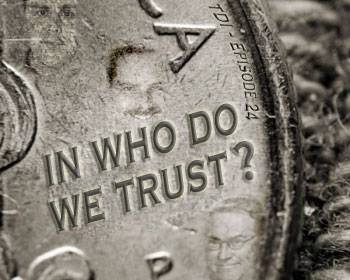
TDI Podcast 24: Trust and Transparency — I recently did the Andrew Horowitz podcast on investing strategies. You stock market gamblers players will find it interesting.
Guests: John C. Dvorak, John Havens and Parker Conrad. Who can you trust when looking for investment and financial advice? We discuss Trust and Transparency in the modern age.
Who do you Trust podcast
There is so much information out there and we take a deep look at the problems with mixing amateurs and pros in the analysis and recommendation of investments. The main question hones in on how the end user can discern if the information they are reading or listening to has embed bias. There is a growing concern as Web 2.0 has made it relatively easy for anyone to broadcast their opinions and comments without any significant oversight.
Parker Conrad (wikinvest.com) argues that credentials are not very important while John Havens (BlogTalkRadio.com) wants references and track records. John C. Dvorak (dvorak.org/blog) thinks that that nothing is different today and skepticism is prudent. Watch out for the fluff.
click to listen:
Audio clip: Adobe Flash Player (version 9 or above) is required to play this audio clip. Download the latest version here. You also need to have JavaScript enabled in your browser.















There is no difference between “amateurs” and “pros” when it comes to the stock market. If the “pros” were really pro then they would be filthy rich and wouldn’t have to sell/give away their advice. Just look at who won that stock pick competition…a lady who didnt know anything about the stock market.
This is a game of the rich, for the rich. Can poor people make some money off the scraps?? Yes, more than in most other ways, but it is still not our game. If you aren’t structuring an IPO, you are playing with scraps mostly manipulted by Wall Street and their in pocket regulators.
God Bless Elliot Spitzer.
I was working for one of my clients yesterday, a financial analyst and stock market “pro” and yes filthy rich. We were discussing the recent MSNBC article on the Countrywide “rescue” by Bank of America, a 2 billion dollar infusion, and his dogged assurance that Countrywide is a solid company.
http://www.msnbc.msn.com/id/20405745/
At that point, my client pointed out to me with Bloomberg software what Mr. Mozilo the CEO has been up to in the last month. It wasnt surprising to see he was dumping mucho shares of his Countrywide stock. We went back as far as mid July and it was all dump. That sure gives me confidence.
John- BTW good show.
John — Good show, good blog. Congrats on doing lunch with Mr. Hearst.
BTW, it should be “In whom do we trust?”
In a declarative sense, the sentence would be “We trust in him.” “Him” is the objective case as is the whom in your sentence. It is the answer to the question.
This is the internet and nobody seems to care, though, about language and its degradation. I have corrected this same problem in others’ writing and have been told it’s just pedantic. I say that confusing the nominative and objective cases is loss of information.
I know, however, that most people are too concerned with other important things, such as image, sex, and work, to care about language. Some of the rest are the stupid ones lost in seas of nonagency. The remaining chosen ones know our immortality is our language, for the most part.
-polemic by Bryan-
John – I thought that you were a seasons writer?? How could you let the following pass: “The main question hones in on…..”.
“Hone” is to sharpen a skill or otherwise. I believe the author meant to say “homes in on”, a term born during the development of radar by the British during WWII, relating to the ability of a sent signal to return to base, i.e – to find itself.
Nobody ever said that spell check was actually intelligent.
And I should have checked my own spelling: seasoned